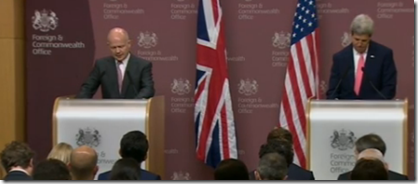My blog looks at different aspects of history that interest me as well as commenting on political issues that are in the news
Sunday 15 September 2013
You wouldn’t know it was only a year away!
Monday 9 September 2013
Common-sense and Syria or doing something is better than doing nothing!
We now have an admission from the White House that it has no ‘irrefutable’ evidence of Mr Assad's involvement in the August attack, but said a ‘strong common-sense test irrespective of the intelligence’ suggested his government was responsible. I’m always a little sceptical when anyone says…common-sense dictates..and this is intensified when it comes to whether or not there is intervention in Syria. We similarly have the view of William Hague against believing anything that Assad said in an interview for American television: ‘We mustn’t fall into the trap of attaching too much credibility to the words of a leader--President Assad--who has presided over so many war crimes and crimes against humanity.’ So there’s no need to apply the beyond all reasonable doubt principle because, as the American Secretary of State pronounced ‘intelligence does not work that way’ and anyway, despite his denial of culpability for the attack (well he would say that wouldn’t he), he’s not to be believed. Now both William Hague and John Kerry may be right and Assad was responsible for the attack but is there not equally the possibility that we are ‘attaching too much credibility’ to their words. In a war of words, truth is often the first casualty.
Whether or not there is intervention seems to hinge on the response of the American Congress. A Washington Post survey said 224 of the current 433 members of the House of Representatives were either ‘no’ or ‘leaning no’ on military action as of Friday, while 184 were undecided and just 25 were backing a strike. In the Senate, the survey suggested that 27 of the 100 senators were ‘no’ or ‘leaning no’, while 50 were undecided and 23 supportive of military action. Many US politicians remain concerned that military action could draw the nation into a prolonged war and spark broader hostilities in the region. The critical question is not whether punitive action is or is not justifiable but what the possible consequences of such action could be. It is this issue perhaps more than any other than contributed to Parliament’s defeat of the government’s motion on the principle of intervention ten days ago. Even if you think that the Assad regime was responsible for the chemical attack, you can still oppose intervention because it would make the situation worse and fail to resolve the question of Syria’s civil war. Other than punishing the Assad regime and presumably degrading its potential for further use of chemical weapons, you have to ask whether this is sufficient justification for intervention. It represents action that has no obvious end. What it certainly does not do is bring about the end of the civil war…surely the only justification for any action, military or diplomatic.
The problem of intervention is that there are no winners. The Syrian oppositions (the plural is deliberate) will be no closer to winning their wars, whether with each other or with the Syrian regime. For some, an external attack on the regime will bolster their support for Assad with increased military and logistical aid. It does nothing to heal the fractious relationship between the United States and Russia and China, a relationship that is fundamental to finding a diplomatic solution to the military impasse. For the Middle East generally, further United States intervention will raise again the spectre of Iraq and the largely unsuccessful mission in Afghanistan and increase not diminish the suspicion by Moslems of the American imperialist state. It makes the creation of a democratic state in Syria (always an unlikely eventuality in the short-term) even less likely. The legacy of the ‘Arab spring’, and in this respect it echoes the ‘democratic spring’ of 1848, is not the creation of democratic states but fractious communities in which democracy is seen, not as an expression of liberal principles, but the means for establishing the tyranny of the majority over the rights (often previously tolerated in dictatorial regimes) of minority groups.
If the only argument for intervention is common-sense dictates, then there is no case at all. This is not appeasing dictators (something dominant powers have always been prepared to do when it suited them) but recognises that intervention makes what will be the only solution to the problem of Syria—a diplomatic and politic one—more difficult to achieve.
